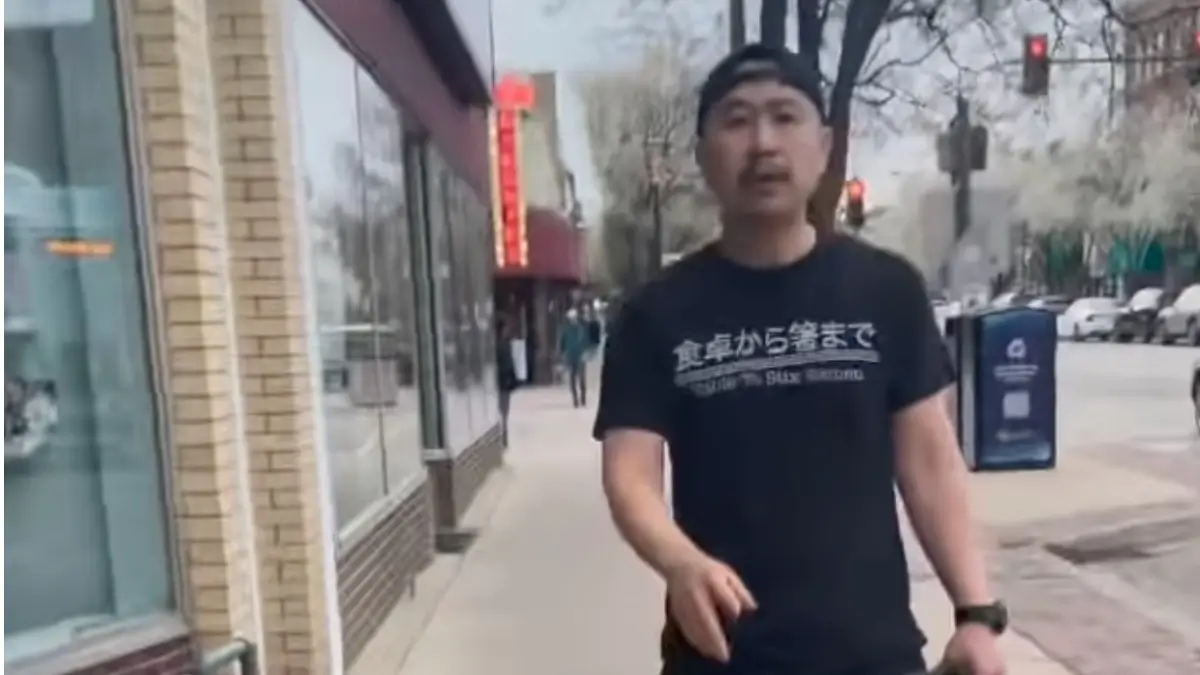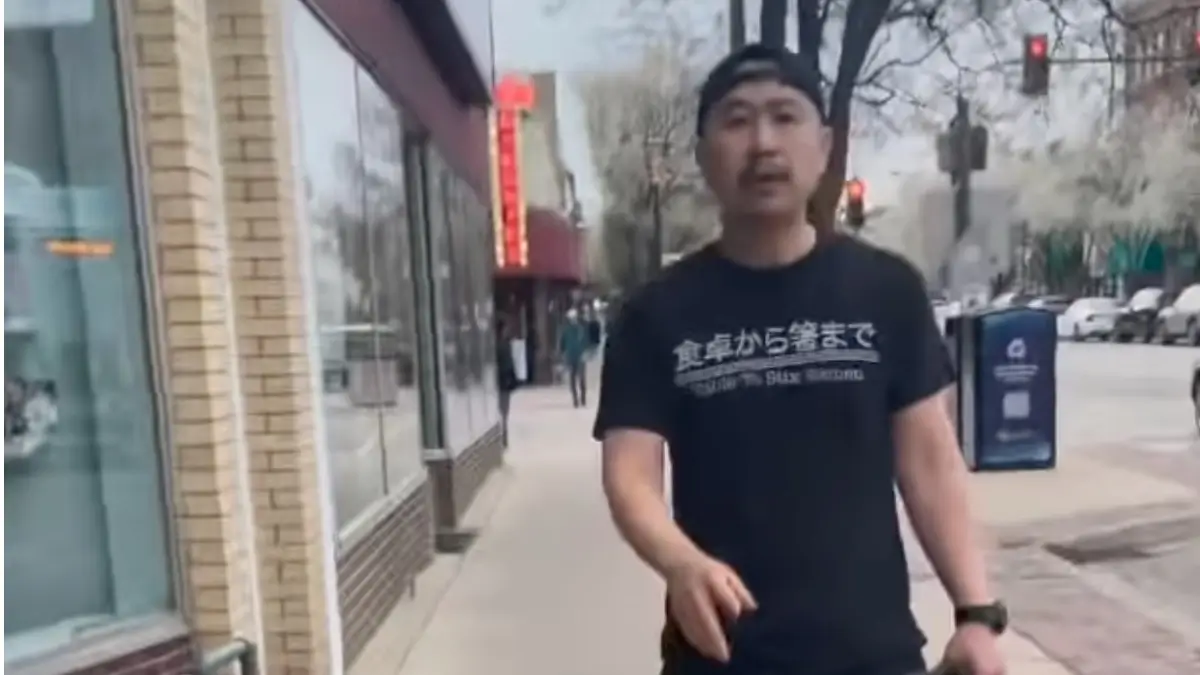‘I Paid for My Food!’: Chicago-Area Restaurant Owner Accused of Racism After Confronting Black Man About Leaving Tip In Viral Video Apologizes After Facing Boycott
A dispute between a restaurant owner and a customer who didn’t leave a tip at an Evanston, Illinois, restaurant last week escalated into a confrontation that later sparked protests and hard discussions about race relations in the city.
The trouble began April 19, when a customer at Table to Stix ramen shop paid his $19.89 bill with a $20 bill, leaving 11 cents extra on his tab, but nothing else.
Kenny Chou, the restaurant’s owner, followed the customer, a Black man, onto Davis Street, where tensions boiled over.

In the now-viral social media video of the confrontation, Chou gave chase as the unidentified customer warned him to back off. Instead, Chou wound up in the man’s face, cussing and looking like he was ready to throw hands. “What are you going to do?” the young man asked repeatedly, then said the video would “blow up on social media” if he lost control.
Chou can be seen on the video demanding the tip and warning the young man not to return to his business, even though the man had paid for his meal, he just hadn’t left a tip.
“I paid for my food. I handed you $20. You cannot charge more than what them and you paid so what are you talking about,” the customer said in the video.
The customer repeatedly told Chou that a tip was optional and accused him of harassment. Technically, the customer was right in the sense that a tip is optional in the eyes of the law, though tipping is customary in the service industry, especially in restaurants.
But it’s also common for people to choose whether or not to leave a tip. At the same time, many in the service industry rely on tips to supplement low wages, which can contribute to heightened emotions in situations like these. Many commenters online said Chou’s frustration was justified.
The video, which was briefly posted to Reddit before moderators took it down, ignited fierce debate over tipping culture, as well as accusations of racial bias. Chou later admitted he lost his temper, saying he felt ashamed after seeing the video, and apologized publicly, calling the confrontation “a lesson in awareness.”
“Bringing shame to my wife as a husband, as an owner. At the same time to my mom and dad,” he said.
According to Chou, the dispute escalated after the customer allegedly suggested that if his business was struggling, the restaurant should raise its prices. Chou claimed he then asked if he could charge $25 instead, prompting the customer to walk out — and Chou to pursue him outside.
The backlash was overwhelming, and Chou suddenly found himself on the wrong side of the Black community. Messages scrawled in chalk outside his restaurant labeled Table to Stix as “Anti-Black, Do Not Eat Here,” while local leaders quickly organized a boycott and press conference demanding accountability. Legislative advocate Meleika Gardner called for Chou to meet directly with the customer and offer a personal apology.
“This boycott is about real consequences and real healing — not branding exercises, not performative gestures,” Gardner wrote, according to local media reports. “The community is asking for an act of courage: that Kenny Chou reach out to the young man and ask what repair looks like to him. And if he is sincere, to offer a public apology to the Black community in person, not just through media outlets.”
Although the customer remained unidentified publicly, he later appeared online, offering an explanation for his decision to skip the tip. When asked why he didn’t pony up, he said, “Oh, I just didn’t want to.” according to CBS.
Chou admitted that his frustration had gotten the better of him, acknowledging that this particular customer had tested his patience in the past. He explained that the stress levels for many restaurant workers, including himself, had been high, especially with the added pressures from economic challenges like President Donald Trump’s tariffs. However, he took full responsibility for his actions, offering no excuses for losing his composure.
Chou said he has since apologized in person to the customer’s brother, offering a handwritten note and a complimentary meal, hoping the apology would reach the young man. Despite this, Chou has yet to respond to invitations to speak publicly at the community protest.
The controversy next became a topic of discussion at Evanston’s City Hall, where members of the Equity and Empowerment Commission discussed issuing a statement condemning incidents like the one at Table to Stix, noting that Black residents have long reported harassment at local businesses.
“This is not the first time that Black residents have mentioned that they’ve had incidents of harassment at restaurants in Evanston,” said Christine S. Escobar, noting that similar concerns had been raised about another local noodle shop, though it was unclear what action, if any, had been taken regarding that business.
Escobar raised several questions: Could the commission issue a statement condemning business owners like Chou or supporting the aggrieved diners? What policies or legislation did Evanston have regarding “hate crimes”? And could fines be imposed on business owners who “harass somebody in this manner?”
Commissioner Jacqueline Mendoza expressed sympathy, acknowledging that, as people of color, they didn’t want such behavior. She also noted her own experiences with it, but questioned whether it fell within the commission’s purview.
Questions were raised about whether city ordinances could address such confrontations more directly, although Deputy City Manager Stephen Ruger noted the city’s limited authority in private disputes.
In the end, commissioners agreed to draft a statement or letter and wait for legal approval from the city before sending it. However, it’s unclear how a formal condemnation from the commission would impact Chou, his business, or the ongoing racial tensions in the community.
Meanwhile, the boycott has taken a toll on Chou’s business and family. Table to Stix has disconnected its phone lines, shut down social media accounts, and faced a barrage of threatening messages. Yelp also temporarily froze the restaurant’s review page after an influx of politically charged posts.
Previously, Commissioner Amari Radcliffe expressed frustrations over the impact of review platforms like Yelp on the voices of those who had expressed concerns about Table to Stix. He pointed out that many who had posted complaints were effectively silenced when these platforms shut down comments.
On Yelp, for example, a notice now appears on the restaurant’s page warning of “unusual activity” following increased public attention. The alert reads: “This business recently received increased public attention, which often means people come to this page to post their views on the news. While we don’t take a stand one way or the other when it comes to this incident, we’ve temporarily disabled the posting of content to this page as we work to investigate whether the content you see here reflects actual consumer experiences rather than the recent events.”
Radcliffe criticized the decision to disable the comments, emphasizing that the issues at hand were real and impacting Black and brown communities. “It’s not fair to keep it quiet,” he said.
Chou, who immigrated from South Korea as a child and has run the restaurant with his wife for a decade, said he is committed to learning from the experience but admitted he feels uncertain about how to move forward.
“That’s the scariest thing,” he told reporters.
City officials, including outgoing Councilmember Devon Reid, pointed to the incident as a sign that deeper structural changes are needed.
Reid advocated for eliminating the subminimum wage for tipped workers, arguing that service staff should not have to rely on customer generosity to make a living wage.
“I would encourage businesses in Evanston to look into alternatives to tipping. It’s unfair to servers that they have to rely on the generosity of patrons. It’s unfair to patrons to not know what the cost might be up front,” Reid said at last week’s meeting at the Levy Senior Center.
As Evanston continues to grapple with the broader issues the confrontation exposed, the future of Table to Stix — and the healing process within the community — remains an open question.

